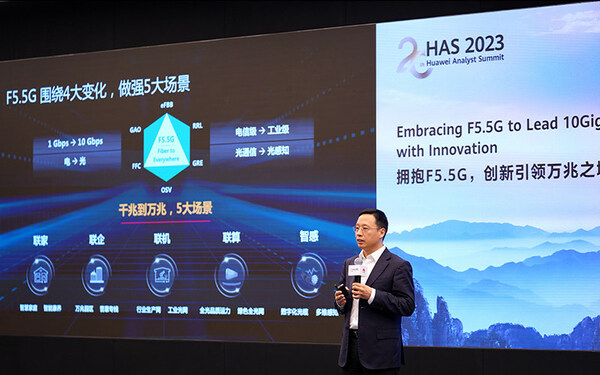SHENZHEN, China, April 21, 2023 /PRNewswire/ — At the 2023 Huawei Global Analyst Summit on April 20, industrial organizations, industry analysts, leading operators and enterprises, and Huawei discussed F5.5G industry development strategies and application scenarios in depth during the "Embracing F5.5G to Lead 10Giga City with Innovation" forum.
To meet network connection requirements for higher-than-gigabit bandwidth, ETSI released the F5G Advanced and Beyond White Paper in 2022, and WBBA released the next-generation broadband development roadmap. The evolution from 1 Gbps to 10 Gbps has gradually become a consensus in the industry. Richard Jin, President of Huawei Optical Business Product Line, said: "Oriented to F5.5G, from Giga network to 10Giga city, Huawei believes that all-optical 10Giga city will start in five scenarios — home, enterprise, machine, computing, and sensing." He also encouraged the entire industry to cooperate in standard formulation, policy promotion, technological innovation, and ecosystem application in order to jointly build 10Giga cities and stride into an intelligent world.
- Home: The emergence of new applications such as ultra-HD video, XR, metaverse, and cloud desktop requires higher bandwidth, lower latency, and higher reliability of home broadband. Taking an 8K naked-eye 3D TV as an example, to implement H.264-compressed multi-view imaging, an access bandwidth of over 3 Gbps is required.
- Enterprise: Smart campus applications require improved network capabilities. For example, applications such as digital-assisted diagnosis and treatment, multi-camera live broadcast of sports events, and holographic interactive design require 10G optical network to provide enterprises with access bandwidth higher than 1 Gbps and network latency lower than 10 ms.
- Machine: With the digital upgrade of industries such as electric power, manufacturing, and port, future industrial production requires a 10G all-optical production network that supports intelligent connection of everything. Such a network delivers bandwidth in excess of 10 Gbps, latency lower than 1 ms, and jitter lower than 20 μs jitter for ultra-HD AOI quality check and production line PLC.
- Computing: With the rapid development of cloud computing, the network bandwidth between data centers and users increases rapidly, and the latency requirement becomes more and more stringent. A 10G network uses the simplified architecture of 400G backbone network, 100G metro access, and all-optical grooming to reduce transmission power consumption and make cloud computing power a ready-to-use resource.
- Sensing: The optical fiber sensing capability enables fiber digitalization and accurately locates faults, achieving visible and manageable fiber networks and improving network operation efficiency. On the basis of home broadband access, the laser 3D optical sensing technology can dynamically monitor the elderly for falls, helping protect their health.
To support the development of 10G services, Huawei has achieved technological innovation and commercial use in multiple fields, such as FTTR, 50G PON, Alps-WDM, 400G, OSU hard pipe, and green industrial optical network, helping operators continuously evolve their networks.
At the forum, Richard Mahony, a member of WBBA and Vice President of Informa Tech, said that WBBA accelerate timely emergence of next generation broadband everywhere, that delivers a sustainable long-term ROI for all industries. Ao Li, Chief Engineer of China Academy of Information and Communications Technology (CAICT), stated that the F5G Advanced era represented by 10G optical networks is accelerating and will build a solid digital infrastructure for home, enterprise, cloud, and computing services.
Tom Pang, Senior Vice President of the Network Planning of Hong Kong Telecommunications (HKT), said that HKT will continue to evolve PON as the next-generation access network. Abigail Cardino, Head of Transformation Governance Division and Vice President of Broadband Business, Globe Telecom, said that Globe creates wonderful experiences for Filipino homes to have choices, overcome challenges, and discover new ways to enjoy life. And Wang Xinping, Director of Information and Network Center, Central South University, pointed out that Central South University hopes to implement high-speed integration of wired, wireless, IoT, and 5G networks through the "One Network" project, and carry multiple functional networks in a unified manner to fully connect campus data and applications.
Looking ahead, industry experts are calling on all parties in the industry to continuously promote innovative services and experiences, facilitate the evolution of all-optical networks to 10G, and stride into F5.5G together, thereby building a better intelligent world.


